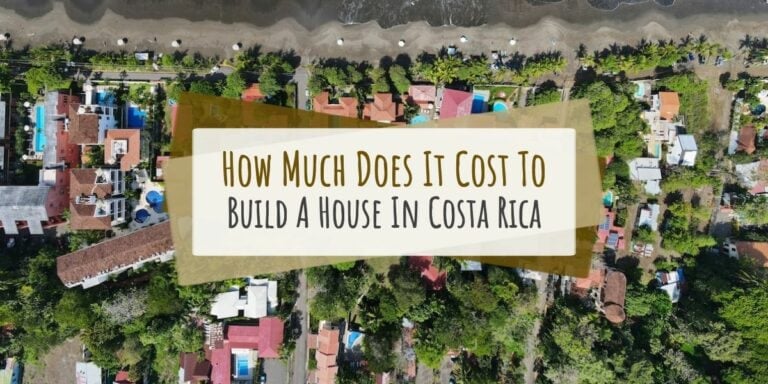Are you dreaming of building a home in Costa Rica? Whether you’re looking to build a retirement villa, holiday cabin, or forever home, it pays to know what you’re getting into before taking the plunge. Building a house in Costa Rica isn’t cheap—it takes a lot of time, hard work, and resources. But with the right planning and know-how, you can keep costs to a minimum while creating your dream home. In this guide we’ll cover what you need to know about building a house in Costa Rica: from understanding the real cost of construction to finding reliable workers and materials. With this knowledge, you can make an informed decision about building the home of your dreams—all without breaking the bank. Let’s get started!
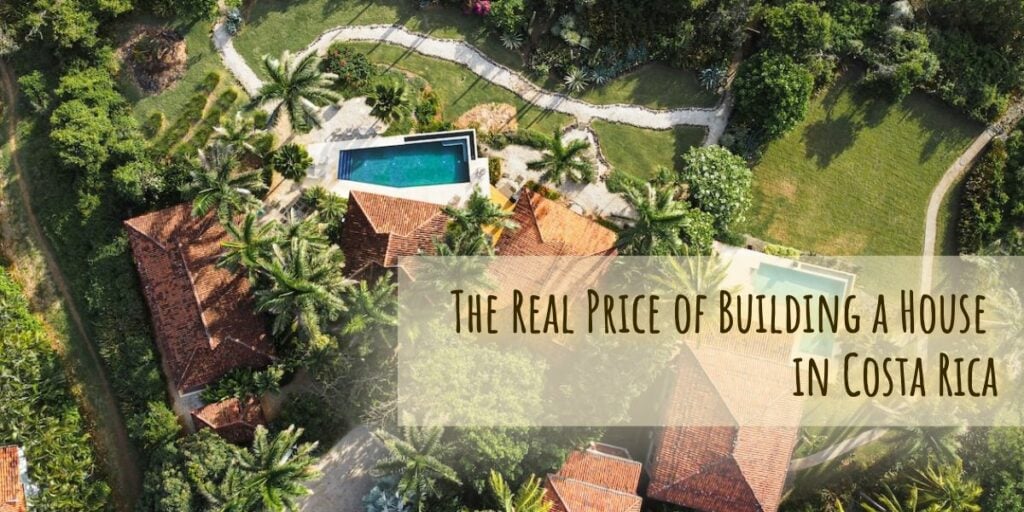
The Real Price of Building a House in Costa Rica
Dreaming of the perfect place to build your dream home? What about Costa Rica? With its breathtaking landscapes, tropical climate, and lower cost of living compared to the US, it’s a no-brainer. But, let’s get down to business. How much does it cost to build a house in paradise?
Moving away from the hustle and bustle of everyday life can feel like a breath of fresh air – especially if you choose somewhere with stunning scenery and good weather. In Costa Rica, this dream could become reality at an affordable price. The country offers great value when compared to similar locations around the world, making it an attractive proposition for those seeking freedom and financial independence.
From initial architecture designs right through to construction costs, we’ll take you through everything you need to know about building a house in Costa Rica. Factors can impact the cost of constructing a house in Costa Rica.
Factors that Impact the Cost of Building a House in Costa Rica
Building a home in Costa Rica is often associated with the idea of freedom and peace. But, how much does it really cost to build a house in this beautiful country? It’s essential to understand that while the average price for building a home may be within reach, there are many other factors involved – such as obtaining the right permits and understanding local building codes – which can add considerable expense.
Labor and Materials
When considering construction costs, it’s important to factor in both labor and materials. Labor costs depend on a variety of factors, including the complexity of the project and the availability of local contractors.
If you decide to go hands-on, it is important to consider whether you’ll need skilled or unskilled workers. Skilled labor is often more expensive, but will typically produce higher-quality results. Meanwhile, the cost of materials varies depending on the quality, quantity, and type required for your build.
Location
The location of a property can impact both the purchase price and the cost of building a new home. Location plays a large part in determining the costs associated with constructing a home in Costa Rica. Depending on where you choose to build, you can find yourself paying more for materials, labor, transportation, and other services.
Certain regions may have their own local building codes that require additional paperwork and permits. Make sure to research these factors before commencing construction work to ensure an efficient building process.
Permits and Taxes
It is essential to obtain the necessary permits and licenses prior to building a home in Costa Rica. Not only can this help you avoid hefty fines, it will also ensure that your property is legally registered with the local government – which is important if you ever wish to sell or rent it out later on. If you are purchasing land for your project, you’ll also need to pay any applicable taxes and fees. All these extra costs could easily double the initial budget if one doesn’t take them into consideration early enough.
Consulting with an experienced real estate agent who has expertise in the Costa Rica real estate market and regulations can help navigate challenges. By implementing careful planning and following guidance, it is possible to live in paradise without incurring excessive expenses.
Ready to turn your dream property in Costa Rica into a reality? Let’s dive into the nitty gritty and make it happen!
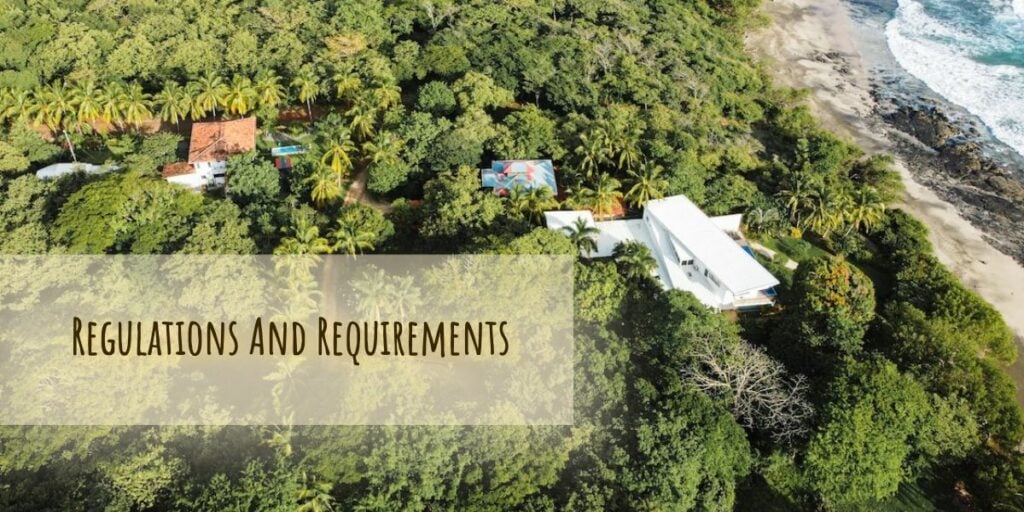
Regulations And Requirements
Building a home in Costa Rica is not as simple as it may seem. There are several regulations and requirements to consider when beginning the construction process. To ensure that you make your dream house into reality here’s what you need to know:
1. Construction permits: Before you begin any building, you must apply for and obtain all necessary permits such as building permit from local government offices. This includes applying for zoning approval and environmental impact assessments where applicable.
2. Structural design: You must also have your structural designs approved by an architect or engineer licensed in Costa Rica before commencing with the project.
3. Design phase: During this stage of the project, a qualified contractor will create scaled drawings of your proposed build including electrical wiring plans, plumbing systems etc., which then must be reviewed and accepted by experts within their field prior to commencement of works on site.
4. Building crew: Once the design has been accepted, the next step is finding a reliable team of builders who can carry out the work efficiently without running into too many building hassles along the way!
Proper preparation can lead to a successful move and a smooth transition into a new home, despite potential challenges.
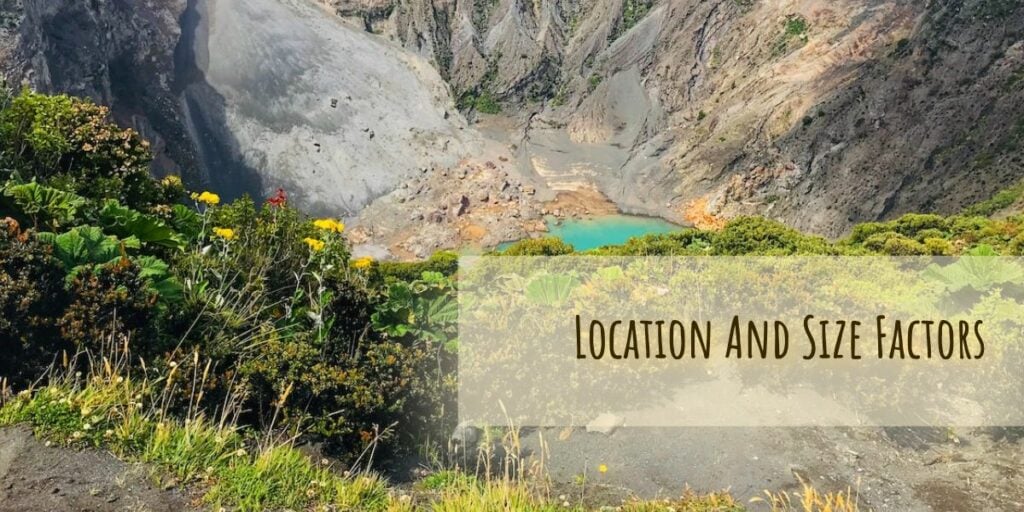
Location And Size Factors
We can’t stress enough that location is very crucial. Location and size are two key factors that determine the average construction costs in Costa Rica.
Prime Location: Small Structure
If you want your home located in a prime location, such as near the beach or downtown San Jose, be prepared to pay more for it than if you were building on land farther away from city centers. The same applies to the size of your floor plan; smaller homes tend to be cheaper than larger ones with multiple rooms and bathrooms. A real estate agent can help you find the perfect spot for your new abode while also discussing budget options depending on its size.
Moderately-priced Location: Medium Structure
If you have a moderately priced place to build your dream home in Costa Rica, this type of location is typically cheaper than a prime spot but still offers plenty of nearby amenities and activities. You may also be able to negotiate with local builders for a lower price on construction materials if you are willing to purchase them locally.
The average cost of constructing a house in Costa Rica varies significantly based on whether it is built in an urban or rural area, its square footage, and other materials used during its construction.
Factors such as soil conditions, foundation type, roofing material, plumbing fixtures, flooring choices, and labor costs will all impact the total price tag when compared with similar properties elsewhere in the country. An experienced contractor should have no problem providing accurate estimates based on these details before breaking ground on any project.
Remote Location: Large Structure
If you’re looking to build a large structure in a remote location in Costa Rica, it will definitely cost more than a smaller one closer to the main cities. Building materials and labor costs are higher in rural areas due to the difficulty of transporting them there. A construction site that is far away from urban centers tends to be more expensive because of limited access and resources.
The construction process in Costa Rica can be tricky, as there are many regulations that need to be followed and permits that must be obtained. Before beginning any type of construction, it is advisable to hire a qualified contractor or engineer who is familiar with the local laws and building codes. This will help ensure that the project meets all necessary requirements and is completed safely and efficiently.

Average Cost Of Materials In Costa Rica
The cost of building in Costa Rica per square foot varies depending on construction type, labor costs, and materials. Basic construction with standard materials usually costs more or less $80 to $150, and for luxurious homes $200 to $300 USD per square foot. That’s starting at $861 per square meter. Other factors like location, terrain, and access to utilities can also affect prices. Remember that your personal costs may differ. If you’re building a custom home, this can make a big difference.
Those looking to build a home off the grid may incur additional costs due to specialized equipment and renewable energy sources like solar panels or wind turbines. Ultimately, the cost of building in Costa Rica varies depending on individual circumstances and preferences but there are always ways to save money through green incentives offered by the government.
Consider location and size when building a house in Costa Rica. Researching prices beforehand can save money in the long run by avoiding mistakes with materials and labor.
How To Budget For Materials And Labor
Now that you know the factors to consider when choosing a location and size of your house in Costa Rica, it’s time to look at budgeting for materials and labor. The average building cost can vary significantly depending on the quality of materials used, as well as any extras such as the construction of outdoor spaces and landscaping.
1. Take accurate measurements of the site where your house will stand so that estimates provided by builders are realistic – otherwise, unexpected surprises could arise!
2. It’s also important to factor in additional costs like building permits, taxes, and labor into your calculations – all of which have an impact on your overall budget.
3. In order to get an accurate estimate of what your dream home will cost you need to consult local contractors who are familiar with the area and its regulations.
4. There are ways to reduce these expenses by shopping around for deals or hiring local contractors who may offer better prices than big companies. It’s essential to compare quotes from multiple sources before committing to one option, as this could save you from paying over the odds later down the line.
5. Make sure to ask questions about each potential expense before signing any agreements with suppliers; this way you’ll be able to get a clearer understanding of what needs to be paid upfront and how much money should be set aside for future payments during construction.
With careful research and planning one can successfully navigate the process of building their own personal paradise in this beautiful foreign country without breaking the bank! Now let’s take a look at the financing options available.
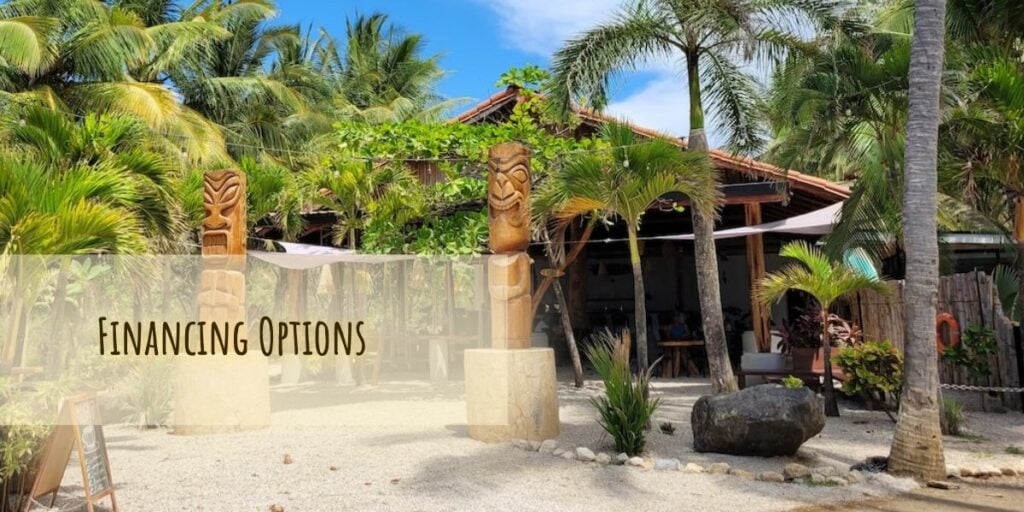
Financing Options
Costa Rica is a popular destination for building a home, as housing prices remain relatively low compared to other countries like the US and Europe. The initial cost of construction can vary depending on the size and complexity of the project. Electrical wires, plumbing lines, tiles, windows, and doors all factor into how much it will cost to build a house in Costa Rica.
Many people consider buying an existing home for sale in Costa Rica instead of building one from scratch. This could be more affordable than new construction since most properties come with basic infrastructure already in place. However, buyers should still do their due diligence and ask plenty of questions before making any investment decisions or signing contracts.
Gringo prices are often higher than what locals pay when having a new house built in Costa Rica. It’s important to shop around and compare quotes among different contractors to get the best deal possible.
Real estate agents with expertise in assisting foreign property buyers in Costa Rica can provide support if working directly with local builders feels uncomfortable.
Expat or Foreign Investor?
The financing options available for purchasing or constructing a home also depend heavily on whether you’re looking for a primary residence or an investment property.
Some financial institutions offer special mortgage programs specifically tailored towards expatriates that may require less paperwork and fees than traditional loan products offered by banks back home.
For foreign investors, it’s a good idea to research the local real estate market and learn about any potential tax benefits or other incentives that may be available. Working with an experienced lawyer can provide valuable advice on how to structure investments and purchase properties in Costa Rica.
It pays to understand the local laws and regulations before entering into any agreements, as this could save you from encountering legal issues down the line.
Local and Foreign Mortgage
Building a house in Costa Rica requires careful consideration of mortgage options. Mortgages are available to both local and foreign buyers, though there may be some restrictions depending on the buyer’s nationality.
When considering the cost of building a house in Costa Rica, it is important to understand that mortgaged loans for primary residences offer more flexible terms than those offered for vacation homes. Many people choose to finance their construction using a mortgage loan, as it can provide an attractive way to spread the cost of construction over extended periods of time. For those looking to build a house in Costa Rica, it is important to do your research and be familiar with the mortgage offerings from local banks.
Meanwhile, foreign banks are not allowed to advertise their services, but it is possible to find good leads about which ones offer the best services by asking an experienced real estate expert. Be sure to look into the requirements for obtaining a loan, such as income verification, collateral for larger loans, and other documentation needed. Make sure to ask about any special offers or discounts that may be available.
Discover your dream home in Costa Rica and make it a reality! With careful research and a thorough understanding of all the financing options available, you can confidently build the perfect home for your unique lifestyle and start living your best life in paradise.
Other Considerations Affecting Building Costs
Here are a few more key points to consider when estimating your costs:
- Fiber Optic Internet: The installation fee for fiber optic internet is often included in construction costs, but it’s important to make sure before signing any agreements.
- Language Barrier: Hiring bilingual contractors and architects is essential if you want things done quickly and efficiently.
- National Parks: Be aware that national parks or other protected areas will require additional permits or permissions from local authorities before beginning construction on your home.
- Design Ideas: Don’t forget about extra features such as hot water systems or solar panels which can add considerable expense to the project – but also provide valuable benefits over time.
No matter which route you choose—building from scratch or investing in pre-existing structures—planning ahead can help ensure that everything runs smoothly during the process while keeping costs manageable throughout the journey
It pays to do your homework before starting your building project in Costa Rica; having accurate estimates will help you stay prepared throughout the process. Although there are many tax implications and fees involved in constructing a home in another country, with proper preparation these issues don’t have to be daunting hurdles to realizing your dream of owning property abroad.
Frequently Asked Questions
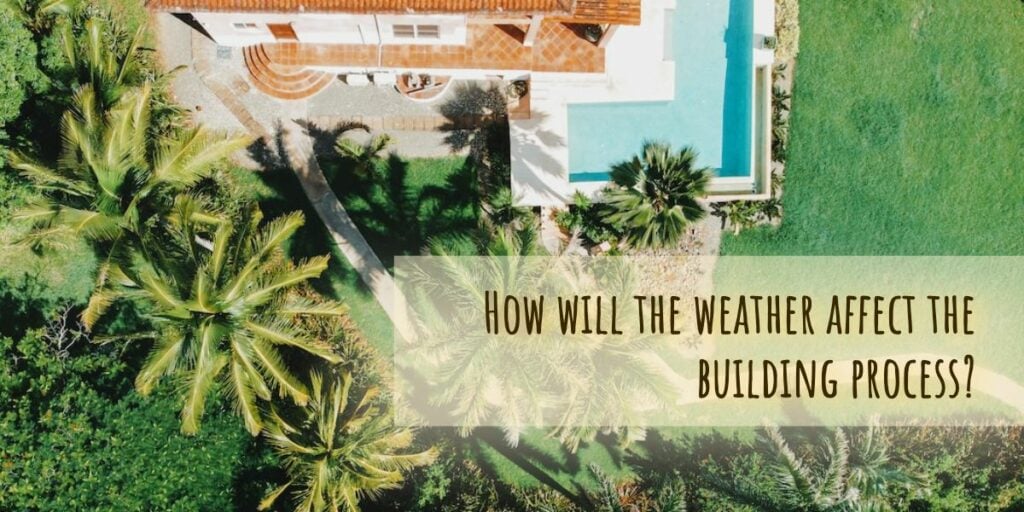
How will the weather affect the building process?
When it comes to building a house, weather is an often overlooked factor. It can greatly affect the construction process and even add unexpected costs.
Construction projects are particularly susceptible to changes in the environment due to their long lead times and reliance on outdoor elements such as sun exposure and wind patterns. From heavy rains that may cause delayed shipments of materials to high humidity which can cause paint colors to run, there’s no telling what kind of disruption Mother Nature could throw your way. And if left unchecked, these disruptions could cost you time and money.
How many experiences do the builders have in Costa Rica?
Building a house in Costa Rica is no small feat. It requires the right location, permits, expertise, and experience of local builders to ensure that your dream home becomes a reality. That’s why it’s important to understand how much experience the builders have before making this big commitment.
When researching potential builders for your project, be sure to ask about their qualifications and previous work done in the region. Experienced contractors should have an impressive portfolio of completed projects they can show you as well as testimonials from satisfied customers. This will help give you peace of mind knowing that your money is being spent wisely on someone who knows what they’re doing when it comes to building in Costa Rica.
Experienced builders are familiar with the climate and terrain which can save time and money during the building process. They know where best to source materials locally or import them from abroad depending on availability and cost-effectiveness as well as any other regulations that must be adhered to when constructing a home in Costa Rica
What types of warranties are available?
When it comes to building a house in Costa Rica, warranties are an important part of the equation. Not only do they provide peace of mind and protection against future issues, but they also help guarantee that you’ll get the highest quality home possible. So what types of warranties should you expect when constructing your dream abode?
Most builders will offer some type of warranty on their workmanship. This may include coverage for any defects or construction problems that may arise during the building process. Some companies may even cover repairs if something breaks after completion.
It’s also worth asking about labor guarantees as well. Many builders will guarantee their labor for a certain period of time after completion, which can provide valuable assurance if anything goes wrong down the line.
In addition, there might also be additional warranties offered based on specific materials used in construction — such as roofing tiles or windows — which could ensure greater long-term protection against damage caused by weather or other environmental factors common in tropical climates like Costa Rica’s.
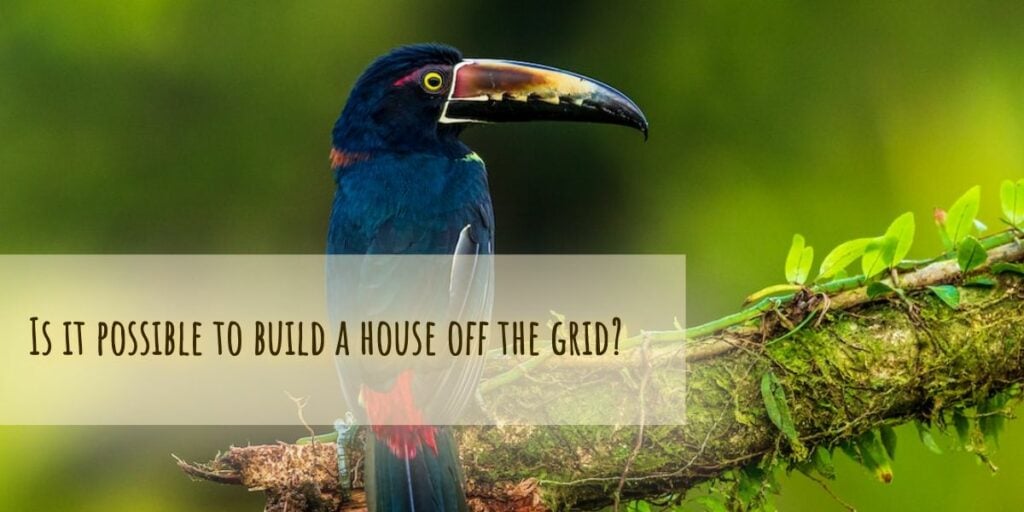
Is it possible to build a house off the grid?
Building a house off the grid is becoming increasingly popular amongst those who crave freedom and an escape from modern society. It’s not only possible but also incredibly rewarding to build your own home without relying on electricity or water utilities.
You can create an amazing off-grid retreat where you have total autonomy over how much power you consume and what types of food you grow – all while drastically reducing your carbon footprint at the same time!
Costa Rica is known for its commitment to sustainability and protecting the environment. The government has implemented a variety of eco-friendly initiatives and programs over the years, from promoting renewable energy sources such as solar and wind power to encouraging citizens to reduce their carbon footprints through sustainable living practices.
Does Costa Rica offer any incentives for green construction?
Costa Rica has made incredible strides in green building over the past decade, offering some truly remarkable incentives and resources for those interested in living off the grid.
From tax credits and grants to specialized training programs, there are countless ways to save money while still taking advantage of renewable energy sources like solar panels or wind turbines. Not only does this help reduce overall costs but it also helps protect the environment – a win-win situation all around!
The country’s commitment to green building doesn’t stop here either; they’ve gone above and beyond by introducing new regulations aimed at encouraging sustainable practices.
For example, developers must now use materials with reduced environmental impact when constructing buildings, as well as ensure their structures meet strict standards related to air quality and energy efficiency. Additionally, local governments have begun providing financial assistance for projects that demonstrate sustainability benefits such as energy reduction or water conservation measures. All of these efforts show just how committed Costa Rica is to promote eco-friendly solutions both inside and outside its borders.
Conclusion
Building a house in Costa Rica can be an incredibly rewarding experience, both financially and environmentally. The country offers a variety of incentives to green builders, from tax credits to specialized training programs.
The government has also implemented regulations requiring developers to use materials with reduced environmental impact and adhere to strict standards related to air quality and energy efficiency. Costa Rica even allows for cell phone towers in certain locations so that you can stay connected while living off the grid – making it one of the best places in the world to build your own eco-friendly retreat
The cost of construction materials such as concrete block, tile roofs, and legal access to property limits can vary greatly depending on the area, but the potential savings offered by renewable energy sources make it worth exploring.
Building a house in Costa Rica can be an exciting and rewarding experience, but it pays to do your research beforehand. Make sure to inquire about available warranties for both the construction process and materials used, as well as any potential incentives or resources that might help reduce costs.
Consider going off-grid if you’re looking for a unique way to save money while still protecting the environment. Costa Rica is an excellent choice for green construction due to its numerous initiatives and resources dedicated to this cause, making it easier than ever to achieve your eco-friendly dream home.
At the end of the day, deciding whether it’s worth investing in green construction initiatives or taking advantage of government incentives boils down to personal preference and financial resources. No matter which route you take though, we are sure you’ll be thrilled with your decision to call Costa Rica your new home.

